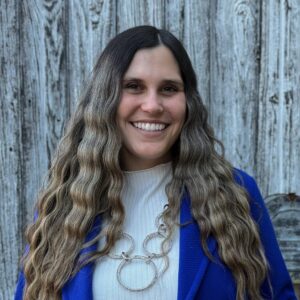
Hunter Mattern, a fourth-year Developmental Psychology graduate student, centers her research on understanding the social challenges faced by autistic individuals and developing strength-based approaches to foster positive social relationships. Her mentor is Suzy Scherf, Ph.D.
Hunter attended the University of Mount Union in Ohio, where she received a bachelor’s degree in neuroscience with a minor in biology. As an undergraduate, she served as a camp counselor with the Cleveland Clinic Center for Autism, which supports autistic youth by providing the opportunity for them to practice their social skills in a naturalistic setting. Hunter attended Saint Joseph’s University for her master’s work, where she served as a peer mentor for the ASPIRE program through the Kinney Center for Autism Education and Support. Her master’s thesis examined gender differences in social and emotional insight among autistic and non-autistic youth and was published in Molecular Autism, a top research journal. Her master’s degree is in experimental psychology.
At Penn State, Hunter led data collection for Suzy Scherf’s NIMH-funded Serious Games for Autistic Adolescents project. Her work on this project has helped advance knowledge on social attention and self-report discrepancies in autistic youth and their parents. Hunter is also working with Dawn Witherspoon, Ph.D., in the Context and Development Lab to gain experience with qualitative, community-informed research methods. This knowledge will support Hunter’s desire to ensure her research is inclusive, prioritizing the perspectives and priorities of autistic individuals. To date, Hunter has one first-authored publication and seven first-authored poster presentations.
The Irene E. Harms Award will provide Hunter with the means to embark on an independent, community-engaged research project that is inclusive, impactful, and transformative to the autistic community. She intends to collaborate directly with autistic college students, both current and former, to explore whether fostering a sense of belonging in a college environment is a meaningful and necessary area for intervention. The Irene E. Harms Award will provide crucial support to initiate this work by providing compensation for participants and the time necessary to fully develop the infrastructure for her project. Hunter desires to create practical, evidence-supported programs informed by the autistic community. She is dedicated to applying knowledge from her basic and translational research to improve the quality of life for autistic individuals and to include the autistic community in her science through meaningful, collaborative research.